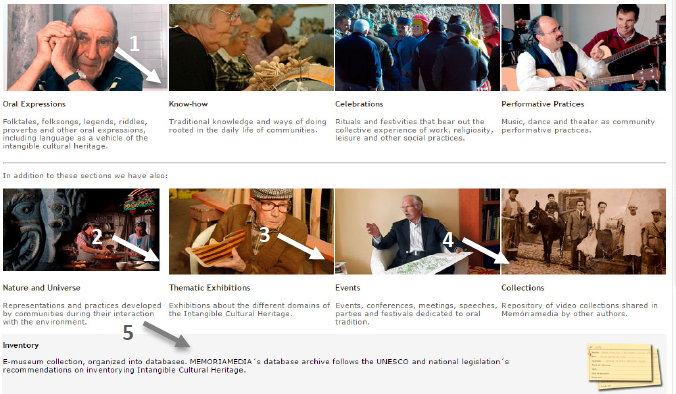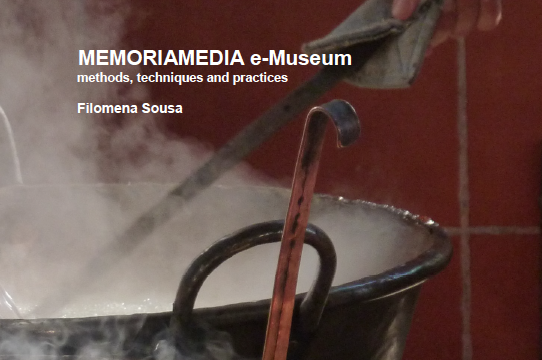 Memória Imaterial CRL (Intangible Memory CRL) is the manager and responsible for MEMORIAMEDIA project – a web museum that produces, shows and shares videos, documentaries and studies related with intangible cultural heritage. The MEMORIAMEDIA project began in 2006 (formally in 2008) and has as main objectives:
Memória Imaterial CRL (Intangible Memory CRL) is the manager and responsible for MEMORIAMEDIA project – a web museum that produces, shows and shares videos, documentaries and studies related with intangible cultural heritage. The MEMORIAMEDIA project began in 2006 (formally in 2008) and has as main objectives:
The research, inventorying, safeguarding and dissemination, in the ethnographic and anthropological domains, rural and river-sea heritage; arts and crafts “know-how”; celebrations, traditional literature, performing practices and other intangible individual and collective cultural expressions;
- Editing and publishing videographic, phonographic and written records through hypermedia and multimedia means, particularly web-video, dvd, cd, cd-rom and books;
- To organize, create and produce events dedicated to the dissemination of Portuguese and international intangible cultural heritage, namely exhibitions, plastic and performing installations, conferences, colloquiums and seminars;
- To organize and carry out training actions on the topics referred to in paragraph 1.
One of the main premises of the project is the dissemination of knowledge produced by civil society and the scientific community. To this end, the results of their work are disseminated online and free of charge through the site www.memoriamedia.net
 The project adopts the spirit and guidelines of the UNESCO Convention (2003) and assumes that ICH are the cultural elements that local communities, groups and individuals identify and value as such, taking into account that these elements are:
The project adopts the spirit and guidelines of the UNESCO Convention (2003) and assumes that ICH are the cultural elements that local communities, groups and individuals identify and value as such, taking into account that these elements are:
• Transmitted from generation to generation;
• Practised nowadays – They are not mere recreations or representations of events that no longer exist, decontextualized , institutionalized or manipulated for mercantilist, political or other interests;
• Manifestations that become transformed with and in time – relating themselves with supra-local contexts of mobility and the flow of people, goods and knowledge;
• ICH is related to tangible, immovable and natural heritage (holistic character of the processes)
The contents and inventory of the project are organized in sections according to criteria based on the recommendations of UNESCO and national legislation for inventorying the intangible cultural heritage.
I.E.L.T. – Instituto de Estudos de Literatura Tradicional (Institute for Oral Traditional Studies) hosted by FCSH-UNL (Faculty of Social and Human Sciences of the New University of Lisbon) is a partner institution in this project.
Year of accreditation: 2014
Domain(s): (a) oral traditions and expressions, including language as a vehicle of the intangible cultural heritage; (b) performing arts; (c) social practices, rituals and festive events; (d) knowledge and practices concerning nature and the universe; (e) traditional craftsmanship.
Safeguarding measures: a) identification, documentation, research (including inventory-making); b) preservation, protection; c) promotion, enhancement; d) transmission, (non-) formal education; e) revitalization
Aiming to create synergies and promote cross-cutting cultural heritages, Memória Imaterial CRL has been establishing cooperation protocols throughout the country with numerous institutions, namely government associations and councils, local authorities, schools, museums, foundations, libraries, cultural groups, local development agents, and other non-governmental organizations.
Memória Imaterial CRL goes out from what the groups and communities select as their intangible cultural heritage, does fieldwork and research on that given reality and draws up promotion and dissemination plans directed to different audiences, making sure that the results can be enjoyed by every social segment.
 Equally important is the promotion of open debate activities and the return of the developments and results to all populations studied. We highlight the work and methodology transversally applied to the MEMORIAMEDIA Project. As an example, we highlight the work carried out in local communities supported by regional authorities in the following projects:
Equally important is the promotion of open debate activities and the return of the developments and results to all populations studied. We highlight the work and methodology transversally applied to the MEMORIAMEDIA Project. As an example, we highlight the work carried out in local communities supported by regional authorities in the following projects:
– Identification and collection of ethnographic records and oral expressions: folktales, folksongs and balladry, riddles, anecdotes and other oral transmitted texts in 22 Portuguese municipalities: Alenquer, Beja, Cabeceiras de Basto, Campo Maior, Cascais, Cuba, Elvas, Esposende, Estremoz, Grândola, Idanha-a-Nova, Miranda do Douro; Montemor-o-Novo, Mora, Peniche, Póvoa de Varzim, Serpa, Sesimbra, S. Pedro do Sul, Sobral de Monte Agraço, Torres Vedras and Vimioso.
– Identification and collection of ethnographic records about “Know-How”: “Regional Gastronomy” (Alenquer, Arruda and Sobral/ Tavira/ Elvas); “Arts and Crafts” (Windmill, Tailors, Carpenters, Basketmakers, Weavers, Shoemakers, Making the Portuguese tambourine, Making bagpipe reeds, and Making bread).
– Identification and collection of ethnographic records about “Celebrations”: Festa dos Velhos em Bruço (Traditional masked celebration, Mogadouro); Easter Celebrations (The Palms Procession, Senhor dos Passos and Enterro do Senhor em Vila deBoim Procession (Elvas), Mandato Procession (Elvas).
Main countries where the NGO works: Portugal
Local, national or international level of the NGO: National

